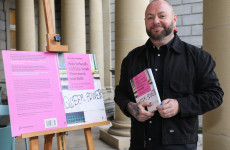Lifestyle
Reviving Radical Hope: Lessons from Ireland’s LGBTQ+ Movement

The struggle for LGBTQ+ rights in Ireland has evolved dramatically from 1993 to 2015, marking a period of significant societal change. Dr. Michael Barron, a prominent social justice advocate and founding director of BeLonG To, reflects on this transformation and the ongoing need for radical hope and activism in the face of rising global challenges.
Dr. Barron recalls his awakening at the age of 22 while living in Dublin’s north inner city. After spending a summer in New York among a vibrant community of young queer individuals, he returned to Ireland feeling invigorated yet aware of the limitations that still existed. This experience ignited a passion that led him to focus on the lived realities of queer survival and the collective hope within the LGBTQ+ community. He emphasizes that survival itself can be a form of activism, particularly for marginalized groups.
Working first with refugee and homeless teenagers, Dr. Barron observed how young people from the most vulnerable segments of society—such as young Travellers, migrants, and individuals of colour—were often neglected. The intersection of queerness with issues of class and race further complicated their struggles. These formative experiences grounded his political beliefs in justice and equity, driving him to advocate for those who faced systemic neglect.
In his work, Dr. Barron initially felt pressured to maintain a professional distance from his personal experiences. He conformed to expectations that deemed emotional expression as unprofessional. However, he eventually recognized that personal narratives are essential to understanding the politics of queer youth work. He states, “The personal is not just relevant to our politics: it is the politics.”
As part of BeLonG To, Dr. Barron and his colleagues tackled pressing issues like education, mental health, and violence. Their efforts resulted in meaningful policy changes, transforming how LGBTQ+ youth were perceived and integrated into national strategies over two decades. Yet he warns that the progress achieved cannot be reduced to mere milestones or headlines; it is vital to acknowledge the hard work, dedication, and emotional toll that went into these victories.
Dr. Barron introduces the concept of “queer optimism,” which he defines as a radical hope that persists despite adversity. This form of optimism is not about superficial inclusion but rather about reimagining the public discourse surrounding LGBTQ+ rights. Referencing José Esteban Muñoz’s assertion that “queerness is not yet here,” he argues that queer youth work is fundamentally about creating futures for individuals whose existence remains politically inconvenient.
The journey from invisibility to inclusion for LGBTQ+ youth in Ireland was marked by countless small acts of resistance—community gatherings, late-night discussions, and creative expressions. These moments, he argues, were essential in fostering resilience and solidarity within the community. Dr. Barron credits his mentors in Irish youth work and the Black queer activists he learned from in South Africa, highlighting the importance of cross-cultural solidarity in the fight for liberation.
Today, Dr. Barron warns of a global resurgence in oppression and scapegoating, especially against marginalized communities. He draws attention to the ongoing humanitarian crises, such as the genocide in Palestine, which evoke a profound sense of urgency to act. He notes that the reality of over 10% of Gaza’s population facing death underscores the fragility of dignity and safety.
In this context, he asserts the importance of remembering the history of LGBTQ+ activism, not as a nostalgic reflection but as a crucial part of honest movement memory. A new generation of activists is emerging, facing unique challenges and injustices. They require a comprehensive understanding of past struggles, including the complexities of coalition-building and the messiness inherent in activism.
Dr. Barron concludes with a heartfelt invitation to embrace the radical hope that has historically fueled movements for change. He presents his upcoming book, *How Ireland’s LGBTQ+ Youth Movement Was Built: Civil Society in the Pursuit of Social Justice*, as a resource for those seeking to understand the intersection of queer memory, political strategy, and community building.
As society grapples with new challenges, the lessons learned from Ireland’s LGBTQ+ movement remain vital. They remind us that change is possible when individuals come together, and that the fight for equality continues to require courage, creativity, and a steadfast belief in a better future.
-

 Top Stories3 months ago
Top Stories3 months agoTributes Surge for 9-Year-Old Leon Briody After Cancer Battle
-

 Entertainment4 months ago
Entertainment4 months agoAimee Osbourne Joins Family for Emotional Tribute to Ozzy
-

 Politics4 months ago
Politics4 months agoDanny Healy-Rae Considers Complaint After Altercation with Garda
-

 Top Stories4 months ago
Top Stories4 months agoIreland Enjoys Summer Heat as Hurricane Erin Approaches Atlantic
-

 World5 months ago
World5 months agoHawaii Commemorates 80 Years Since Hiroshima Bombing with Ceremony
-

 Top Stories3 months ago
Top Stories3 months agoNewcastle West Woman Patricia Foley Found Safe After Urgent Search
-

 Top Stories5 months ago
Top Stories5 months agoFianna Fáil TDs Urgently Consider Maire Geoghegan-Quinn for Presidency
-

 World5 months ago
World5 months agoCouple Convicted of Murdering Two-Year-Old Grandson in Wales
-

 World5 months ago
World5 months agoGaza Aid Distribution Tragedy: 20 Killed Amid Ongoing Violence
-

 World5 months ago
World5 months agoAristocrat Constance Marten and Partner Convicted of Infant Murder
-

 Top Stories4 months ago
Top Stories4 months agoClimbing Errigal: A Must-Do Summer Adventure in Donegal
-

 Top Stories4 months ago
Top Stories4 months agoHike Donegal’s Errigal Mountain NOW for Unforgettable Summer Views









